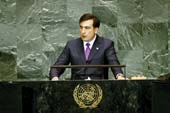Saakashvili says Europe is divided by a “new wall”
By Mzia Kupunia
Monday, September 28

Saakashvili spoke about the brief war with Russia in August 2008, saying that hundreds of ethnic Georgians had been killed and wounded and tens of thousands of civilians forced to flee “in the face of ethnic cleansing that independent human rights organisations have documented.” The President said that “acts of brutality have gone unaddressed - in direct contravention of international law, the norms of this institution and internationally signed agreements designed to reverse these wrongs. There are facts that confront us as we gather here today. And these facts do have a name: armed aggression, ethnic cleansing, mass violations of human rights and illegal occupation.”
The President said that Georgia “cannot and will not accept a new dividing line in our country. That is an unchangeable commitment.” He said that the “wall” should be torn down peacefully, “with the power of our ideas and the strength of our conviction.” “We do not expect it to disappear overnight. We understand the need for patience. But the history of the Berlin Wall teaches us that patience must not be passive,” Saakashvili said.
He recalled his last year speech at the UN General Assembly, saying that he has been following through the promises he made at the same podium a year ago concerning strengthening democracy, fostering pluralism and expanding individual liberties. “Already, we have set reforms in motion which within the next year will advance the progress of the Rose Revolution and irreversibly deepen our identity as the freest state in our region,” he stated.
Saakashvili went on speaking about the reforms carried out in Georgia during the year. He said that the Government had “permitted” three months of opposition rallies to “proceed unhindered, even though they closed down the main street of our capital, reflecting our deep commitment to pluralism and our respect for dissent and freedom of speech.” He said that opposition-controlled TV stations have been given permission to transmit across the nation. He named the involvement of opposition parties in Georgian Security Council sessions and the Georgian Government’s commitment to the direct election of Mayors as means for achieving stronger democracy. He also spoke about the changes in the election code now underway, saying that “in the next few months we will go even further”. He said reforms will be carried out to ensure the freedom of the court system and constitutional changes will be adopted to transfer power from the Presidency to a stronger Parliament. “We do this because a vibrant democracy is one of the best ways to topple this new wall,” Saakashvili stated.
The President spoke about the Georgian economy, saying that the Georgian people are hard working and skilled “but are bearing the double punishment of a global economic downturn and the economic consequences of last summer’s invasion.” Saakashvili said the Georgian administration is focused on creating more jobs. “Our biggest imperative at home is to create more employment, and we are doing all to pursue that goal, every day. We are heartened that this month the World Bank named Georgia as the eleventh most attractive country in the world for doing business when only a few years ago we were 122nd,” he noted.
In the closing part of his speech he once again touched upon the issue of Georgia’s breakaway regions, saying that “together, with all of Georgia’s diverse ethnic groups and religions, we will prevail over this illegal occupation and reverse this ethnic cleansing… Abkhazia today has been emptied of more than three quarters of its population. Gardens and hotels, theatres and restaurants have been replaced by military bases and graveyards. It will take time, but Abkhazia will once again be what it was: the most wonderful part of Georgia.”
